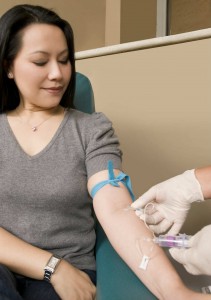So you want to have a baby and would like to know more about pregnancy tests? Or did you do a urine pregnancy test and it was negative, yet were convinced that you were pregnant? Here’s the article for you!
First, to diagnose pregnancy, you can use urine or blood tests. The earlier a pregnancy is confirmed, the faster the mother can implement good lifestyle habits to promote the growth of her baby and improve her wellbeing. Additionally, by learning you are pregnant, you can start your monitoring with your health professional, nurse, midwife or doctor, depending on what you choose.
Educational video from Marie
Human Chorionic Gonadotropin Hormone (hCG)
The pregnancy hormone, which is called the human chorionic gonadotropin hormone (hCG), a marker in the blood that indicates pregnancy. When someone is pregnant, the quantity of this hormone significantly increases in the blood, up to about ten weeks. Then it descends a bit to then stabilise during the last trimester. The hCG hormone will remain in her blood through the pregnancy. Around the 30th week, it will slowly increase up to childbirth.
When doing a blood count (with a prescribed blood test), if we find a high level of hCG, it can reveal:
- A more advanced pregnancy
- Multiple pregnancy (twins or triplets)
- Different possible pathologies (ex.: trisomy)
On the contrary, if the hCG level is very low compared to during pregnancy, it can indicate that the pregnancy is not as advanced as though (calculation error), or there’s a risk for imminent miscarriage. In the latter case, the woman needs another blood test 24-48 hours later to revalidate the hCG rate. Usually, the rate should have increased significantly. If not, we will look for other signs of miscarriage: stomach cramps, bleeding, generalised ailments, discomfort.
Urine Pregnancy Test
Urine pregnancy tests sold in pharmacies rely on the Elisa technology. This technology is sensitive not to the hCG hormone during blood tests but to the anti-hCG, an immunoenzyme found in urine only during pregnancy. It’s secreted due to the gradual development of the placenta and fetus.
When should you do a urine pregnancy test?

These markers vary from one woman to another, and its detection also varies. This is why manufacturers usually suggest doing the pregnancy test with your morning urine. It’s more concentrated, which means the tool will be more effective, even though it can also work at other times during the day. Due to variations in the levels from one woman to another, you always have to be careful interpreting the results. Don’t forget to check the expiry date of the test, because if it has expired, it can influence the result (false negative). Finally, follow the instructions to the letter to ensure its effectiveness.
Always rely on the manufacturer’s guide to do the test and read the results. For pregnancy tests that aren’t digital (where a yes or no, pregnant or not pregnant appears on a screen), a vertical bar or plus should appear in the results window. If it doesn’t, the test isn’t valid. So:
- If the urine pregnancy test shows nothing in the zone after having been soaked with urine following the proper procedure, your test isn’t valid and not considered significant
- If the pregnancy test shows a vertical line in the zone, your test is negative
- If the pregnancy test shows two vertical lines in the zone, your test is positive, independent on the darkness of the colour, dark or pale.
The most significant error with urine pregnancy tests is doing them too early when the marker isn’t detectable. That is why if your menstrual cycle is very regular, you are at the date when you usually have your period and nothing happens, I advise that you wait a week before doing another test if the first one was negative. If you can hold off that is! 😊 Do another test if you still haven’t begun menstruating.
However, if you don’t have a regular menstrual cycle, it’s challenging to know the right time to do the test. Maybe it’s when you start having pregnancy symptoms, such as:
- Swollen and sensitive breasts
- Bloated stomach
- Cramps that resemble premenstrual cramps
- Etc.
If these signs continue, and the health professional believes that it’s necessary, you might have a blood test to check for the hCG hormone. It’s much more precise than a urine test. Also, the doctor might prescribe an ultrasound to verify the age of the pregnancy since the date of your last menstruations are hard to establish.
Did you know that a urine pregnancy test sold in a store must be approved by Health Canada to test the product and protect consumers? You can check the list of recognised and approved tests on Health Canada’s website if in doubt. Many companies make urine pregnancy tests that can’t be sold in Quebec or even in Canada.
I hope some of this information helps answer questions you might have about different pregnancy tests and their use to ensure you get the best results.
I wish you all the best!
Don’t forget to watch my videos and read my other articles that are full of information.
Talk soon,
Marie
The Baby Expert



